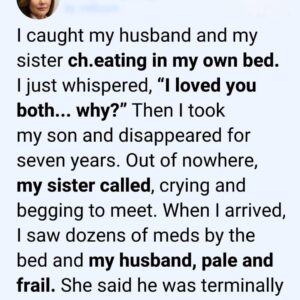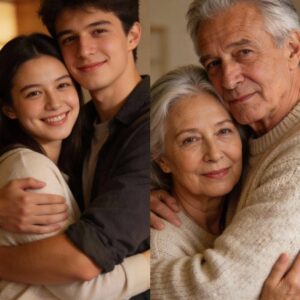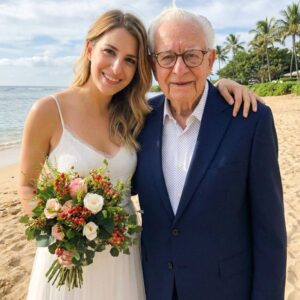Georgia was at the beach with her grandkids when they suddenly pointed toward a nearby café. Her heart lurched as they shouted, “Grandma, look— that’s our mom and dad!” The couple inside looked uncannily like Monica and Stephen, the daughter and son-in-law who had died in a car accident two years earlier. What followed unraveled everything she thought she knew.
Grief settles in like a fog—some days a dull weight, other days a blow that knocks the breath out of you. For two years, Georgia had built a quiet routine around Andy and Peter, her grandchildren, trying to give them stability after the loss. Then came the anonymous letter on a summer morning: five words in a shaky hand, “They’re not really gone.” Her hands trembled reading it. Hope and terror tangled in her chest. She’d convinced herself she’d made peace; the letter pulled that peace apart.
She was about to discard it when her phone buzzed. A charge alert on Monica’s old credit card—$23.50 at a local coffee shop. The card had sat untouched in a drawer for two years. Confused, she called the bank. The representative, Billy, told her there was no physical transaction; it had been made with a virtual card linked to the account—and it had been activated a week before Monica’s reported death. The chill that ran through her wasn’t just from the cold truth of the charge. She called her friend Ella, told her about the letter and the strange activity. Ella suggested it could be a mistake, but both of them knew something more complicated was unfolding.
That Saturday, Georgia took Andy and Peter to the beach. Ella joined to help watch the boys while Georgia clutched the letter, still reeling. Then Andy shouted. Across the sand, at a café near the boardwalk, a woman with Monica’s dyed hair and a man who moved and carried himself like Stephen sat together, sharing fruit. Georgia felt the world tilt. She asked Ella to stay with the children and followed, keeping her distance. The couple walked toward a small cottage cloaked in grapevines. They moved like two people carrying heavy secrets—whispering, occasionally laughing, the woman tucking her hair behind her ear in the exact way Monica did, the man favoring a slight limp Stephen had acquired in college sports.
The man called her “Emily.” Georgia’s blood ran cold. She watched as they entered the cottage, then dialed 911. She stayed by the fence, waiting for something to confirm what her eyes had already told her. Gathering courage, she walked up and rang the doorbell. The door opened. Monica’s face drained of color when she saw her mother. Stephan appeared behind her. Before any explanations could spill out, distant sirens grew louder.
“How could you?” Georgia’s voice broke between rage and grief. “You left your own children. Do you have any idea what you put us through?”
Police arrived. Two officers approached cautiously; what they were facing was rare, impossible to categorize at first glance.
Monica and Stephan—now calling themselves Emily and Anthony—began to talk, haltingly at first. “It wasn’t supposed to be like this,” Monica said, her voice trembling. “We were drowning. The debts, the threats—the loan sharks didn’t stop. We thought if we disappeared, the kids would be better off without us. We staged the accident, made it look like a cliff fall. We moved, changed our names, tried to start over.” Stephan added that the pressure wasn’t just financial; they had been intimidated beyond reason and didn’t want to drag Andy and Peter into that chaos.
“I couldn’t stop thinking about them,” Monica admitted. “So we rented this cottage, just to be near. We never stopped watching.” The confession tore at Georgia—sympathy laced with simmering anger. The choices had been devastating; the motive tangled in fear and a warped attempt at protection.
Ella arrived with the boys. Andy and Peter burst out, shouting, “Mom! Dad!” Their faces lit up in a way Georgia hadn’t seen in years. Monica crumpled, holding her children, tears streaming down her face. “I missed you,” she whispered. “I’m so sorry.” Stephen stood nearby, guilt and exhaustion evident.
The reunion was brief. The officers explained the legal consequences: disappearing, faking a death, the web of lies—they had all crossed lines. Georgia watched her grandchildren’s confused faces as their parents were taken aside. The senior officer looked at her with quiet compassion. “The truth was going to come out,” he said. “Now you’ll have to decide what’s best for the children.”
That night, after tucking Andy and Peter into bed, Georgia sat alone with the anonymous note, its five words echoing with new meaning: They’re not really gone. They hadn’t been gone; they had chosen to leave. Somehow that knowledge stung sharper than any finality death had offered. “I don’t know if I did the right thing,” she whispered to the empty room, “but I’ll do whatever it takes to keep them safe.”
The aftermath blurred—legal consultations, whispered conversations, the heavy, complicated reunion of a fractured family. Georgia had to navigate how to explain this to two children who’d been told their parents were dead, while also confronting her own conflicted feelings about loyalty, abandonment, and the limits of forgiveness.
The mystery of the letter remained unsolved. Whoever had sent it had planted a seed that led to the truth. Whether it was coincidence or someone trying to nudge fate, it didn’t matter as much as what came after. Monica and Stephan weren’t gone. They had been hiding, collapsing under pressure, making choices that tried to protect and instead fractured lives further.
Georgia’s question lingered: had she done right by calling the police, by exposing their false deaths, by dragging a secret back into daylight? There was no easy answer. The children had their parents back, but the foundation beneath them had shifted. Healing would take time, truth would demand work, and trust would have to be rebuilt—carefully, painfully, honestly.
The story ends not with closure, but with the quiet, ongoing work of family—broken, complicated, and still trying. Would you have done the same?




